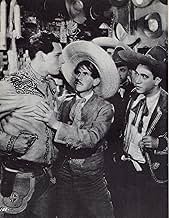IMDb RATING
6.8/10
189
YOUR RATING
A "comedia ranchera", where two good friends fall in love with the same girl.A "comedia ranchera", where two good friends fall in love with the same girl.A "comedia ranchera", where two good friends fall in love with the same girl.
- Awards
- 1 win & 1 nomination
Carlos López
- Florentino
- (as Carlos López 'Chaflán')
Manuel Noriega
- Don Rosendo
- (as Manolo Noriega)
Lucha María Ávila
- Cruz niña
- (as Lucha Avila)
Trío Tariácuri
- Trío
- (as Trío Tariácuris)
- Director
- Writers
- All cast & crew
- Production, box office & more at IMDbPro
Storyline
Did you know
- TriviaThis film's initial USA telecast took place Friday 15 November 1939 on New York City's pioneer experimental television station W2XBS, which would not be granted full time commercial status until 29 June 1941 as WNBT (Channel 1).
- ConnectionsReferenced in Esmeralda Comes by Night (1997)
Featured review
This film is generally held in much lower regard than de Fuentes other 1936 classic, Vamanos con Pancho Villa. The conventional wisdom is that Alla en el Rancho Grande, despite having been a huge commercial success, lacked the artistic merits and brave political message of Vamanos con Pancho Villa, which a survey of Mexican cinephiles rated the most important Mexican film ever in a famous 1994 survey. This film, on the other hand, has been generally regarding in Mexico as fodder for the ignorant masses, which set off the culturally embarrassing genre of the ranch comedy.
With my expectations tempered by that background, I must say that I found Alla en el Rancho Grande to be quite an outstanding surprise. For starters, the humor is actually funny; yet it's done with a subtly and restraint quite uncommon in Mexican "comedy". This is a testament to the skill of the actors, as well as the director and editor. Secondly, the film does a good job of providing a look into the true life of a Mexican village, with references to atole and pulque and the like. It's also filmed on location and it looks and feels authentic. Maybe that's one factor which drew audiences in the day, not just their presumed lack of sophistication. The storyline is well developed and character list is fairly busy; this is not a primitive talkie like most Mexican films of the 1930s. And the songs are all well done and interesting (you'll note no less than the great Emilio Fernandez in the cockfight dance). Gabriel Figueroa (a student of Eisenstein and a contemporary of Greg Tolland) does steady early work here as cinematographer. Finally, Esther Fernandez is perfectly cast as the orphaned Cruz; her youthful spark and ever-so-slightly coquettish glances provide a remarkable complexity and attraction to her character, which in fact make the whole story line plausible.
Mexican cinephiles tend to be excessively slanted towards high art in film (call it elitism), and are also frequently tinted by a mild strain of malinchismo (a peculiar yet pernicious domestic strain of self-loathing or mental slavery). Unencumbered by those mental deficiencies, I must say that Alla en el Rancho Grande might actually be the height of pre classic Mexican cinema.
A final note, de Fuentes remade this film in 1949 with Jorge Negrete in the lead. Needless to say, it was a sad retread unworthy of the original film.
With my expectations tempered by that background, I must say that I found Alla en el Rancho Grande to be quite an outstanding surprise. For starters, the humor is actually funny; yet it's done with a subtly and restraint quite uncommon in Mexican "comedy". This is a testament to the skill of the actors, as well as the director and editor. Secondly, the film does a good job of providing a look into the true life of a Mexican village, with references to atole and pulque and the like. It's also filmed on location and it looks and feels authentic. Maybe that's one factor which drew audiences in the day, not just their presumed lack of sophistication. The storyline is well developed and character list is fairly busy; this is not a primitive talkie like most Mexican films of the 1930s. And the songs are all well done and interesting (you'll note no less than the great Emilio Fernandez in the cockfight dance). Gabriel Figueroa (a student of Eisenstein and a contemporary of Greg Tolland) does steady early work here as cinematographer. Finally, Esther Fernandez is perfectly cast as the orphaned Cruz; her youthful spark and ever-so-slightly coquettish glances provide a remarkable complexity and attraction to her character, which in fact make the whole story line plausible.
Mexican cinephiles tend to be excessively slanted towards high art in film (call it elitism), and are also frequently tinted by a mild strain of malinchismo (a peculiar yet pernicious domestic strain of self-loathing or mental slavery). Unencumbered by those mental deficiencies, I must say that Alla en el Rancho Grande might actually be the height of pre classic Mexican cinema.
A final note, de Fuentes remade this film in 1949 with Jorge Negrete in the lead. Needless to say, it was a sad retread unworthy of the original film.
- ixta_coyotl
- Oct 13, 2007
- Permalink
Details
- Runtime1 hour 35 minutes
- Color
- Sound mix
- Aspect ratio
- 1.37 : 1
Contribute to this page
Suggest an edit or add missing content













